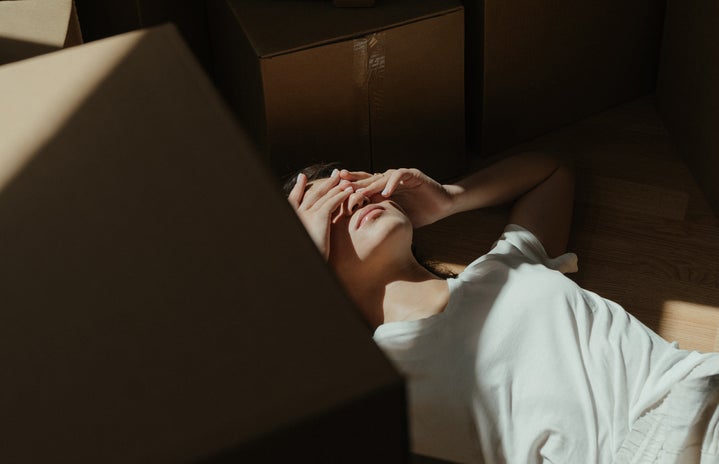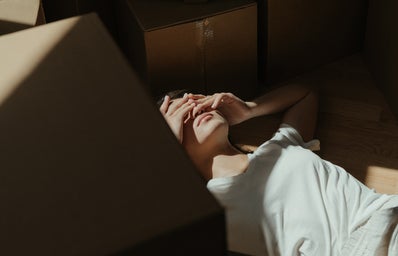The Her Campus National Editors write about products we love and think you’ll love too. Her Campus has affiliate partnerships, so we get a share of the revenue from your purchase. All products are in stock and all prices are accurate as of publication.
What are PCOS and endometriosis?
Hormones can suck. Take it from me, a young college-aged woman living with PCOS and Endometriosis. PCOS stands for Polycystic Ovarian Syndrome, and The Cleveland Clinic defines it as “a hormonal imbalance caused by the ovaries (the organ that produces and releases eggs) creating excess male hormones.” In other words, my body produces an imbalance of “male” hormones (androgens), as well as insulin, than female hormones (estrogens). This imbalance causes a variety of different symptoms, such as irregular periods, hirsutism (“abnormal”/excessive hair growth), painful periods, acne, obesity, infertility, and, as defined by the name, cysts on the ovaries. Endometriosis is commonly diagnosed with PCOS but can be its own entity. Endo is defined by the Office on Women’s Health as “when tissue similar to the lining of the uterus grows outside of your uterus and on other areas in your body where it doesn’t belong. Most often, endometriosis is found on the: ovaries, fallopian tubes, tissues that hold the uterus in place, outer surface of the uterus.” Endo can cause “extremely painful periods, chronic pain in the lower back, pain with sex, intestinal pain, digestive/stomach problems, bleeding or spotting in between periods.”
Both of these diseases tag-team the job of slightly ruining my life, but thankfully, through modern medicine, physical therapy, and a supportive system around me, I have learned to cope with the symptoms and revelations I have had to endure since my diagnosis of Endometriosis and PCOS.
my story
I was 15 when I went to the gynecologist for the first time. They did no exam, no bloodwork, and not even a questionnaire pertaining to the chronic and exhausting pain I was dealing with every month. I did not go in for an “acquaintance visit”. I wanted answers, and I was not given them. I was sent home disappointed and tired after fighting for the treatment I so desperately needed. The only answer I was given was to stop taking the birth control that another doctor provided me, which had been making me extremely ill and nauseous for months, without any option or opportunity to try a new medication.
I didn’t go back to the gynecologist again until I was almost 18. This time I went to a different doctor and, lo and behold, she listened to me. We did a physical and mental exam, and almost immediately I was diagnosed with PCOS and Endometriosis. She said it was likely that I had these diseases since I started having a period, aka since I was about 11 years old. I was started on different birth control that had less estrogen in it to hopefully subside my side effects while still fighting the symptoms I was feeling due to the imbalances in my body. Surprisingly, the new birth control did not make me sick. It still ended up not being the right one for me, but it was life-changing to get a diagnosis. Obviously, I wish I didn’t have a chronic illness, but it was almost a relief to have something on paper that defined what I had been feeling for almost 10 years of my life. Since that diagnosis, I have started and stopped the birth control I was given, as it made me not feel like myself, and the list of possible side effects and risks of taking it is much too long for me.
My wish for the future is that more research is done on hormonal imbalances in women. There has to be a better option than birth control that has a page of side effects as big as my torso. We have to stop the stigma surrounding female health, as this is dampening the possibility of relief for these extremely painful conditions.
How I cope with my symptoms
First, what are the symptoms that I, personally, experience with these conditions? I experience painful periods, digestive and stomach problems (that have led to other diagnoses), hirsutism, acne, and intestinal pain. Note: this is what works for me, what works for me may not work for everyone, and I am not perpetuating that everyone who has these conditions will or will not have these symptoms.
painful periods
Hot water bottles and heating pads are my saving grace when it comes to that time of the month. Putting one on my back and one on my lower stomach helps so much in dealing with the pain. I try not to take too many over-the-counter medications, but the little packets of Tylenol that dissolve on your tongue are also part of my period regimen. To make dealing with cramps a little more bearable, I recently got a different heating pad that is actually in the shape of a stuffed animal! Here is the link to shop if you would like to check them out!
stomach/intestinal problems
After my ordeal with the first birth control I was on, I had lasting stomach issues which still affect me now. I was diagnosed with CVS (Cyclical Vomiting Syndrome) over the summer and have finally gotten put on a medication that has worked for me. Before I had that though, I was (and still am) a big fan of acupuncture bracelets for nausea, peppermint tea for stomachaches, and supplements like fiber, probiotics, and vitamin C to try and build some immunity and resistance to these issues.
hirsutism
This is probably the most annoying and degrading part of having PCOS and Endo for me at least. Hirsutism is the excess growth of hair in places where hair should not grow. It is embarrassing, and I have even spent hundreds of dollars on laser treatments to remove the hair on my face and chest to no avail. Waxing has tended to work the best for me, but eventually, I would like to try getting electrolysis, or some sort of other permanent hair removals. I remember when I was in high school, I was wearing a v-neck shirt and I had forgotten to shave my chest. A girl came up to me and said “You have hair on your chest, are you a man?” and I was absolutely shattered. I would love to say I am more confident now, but I really am not. I still want to have a smooth face, and be able to wear crop tops and v-necks without having to worry about what people will say. I haven’t found anything that has truly worked for me so far, but if I ever do, I will make sure I share it with the world.
acne
Most people with periods tend to get hormonal acne. It occurs mostly on the chin and neck. Before having a stable skincare regimen that worked for me, it was almost impossible to get rid of the painful cystic acne that plagued my face. Thankfully, during my junior or sophomore year of high school, I found Stridex pads. These were miracle workers for my oily and acne-prone skin. I do have to say, Stridex pads are very drying, so I pair it with the Clinique Moisturizing Gel or, if I’m feeling really fancy, I’ll pair it with my sample size of the Tatcha Dewy Skin Cream which is an incredible product that I adore. I also began to use spot treatments like the Clean and Clear Advantage Acne Spot Treatment and cleaners like the Cerave Renewing SA Cleanser.
In conclusion…
I may have hormones that hate me, but finding a community through social media and the internet really helps me feel less alone in the process. Using the coping strategies I listed throughout this article, I have learned to deal with the cards I have been dealt. But one thing I’m sure of is, I will never stop pushing for more research and more ways to treat the ways women are affected by PCOS and Endometriosis.


